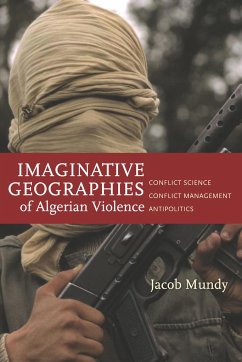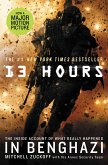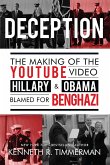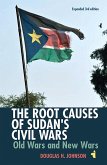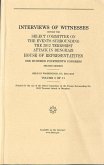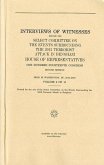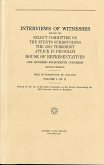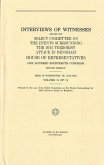Jacob Mundy
Imaginative Geographies of Algerian Violence
Conflict Science, Conflict Management, Antipolitics
Jacob Mundy
Imaginative Geographies of Algerian Violence
Conflict Science, Conflict Management, Antipolitics
- Broschiertes Buch
- Merkliste
- Auf die Merkliste
- Bewerten Bewerten
- Teilen
- Produkt teilen
- Produkterinnerung
- Produkterinnerung
Jacob Mundy is Assistant Professor of Peace and Conflict Studies at Colgate University. He is coauthor of Western Sahara: War, Nationalism and Conflict Irresolution (2010).
Andere Kunden interessierten sich auch für
![13 Hours 13 Hours]() Mitchell Zuckoff13 Hours18,99 €
Mitchell Zuckoff13 Hours18,99 €![Deception Deception]() Kenneth R TimmermanDeception15,99 €
Kenneth R TimmermanDeception15,99 €![The Root Causes of Sudan's Civil Wars The Root Causes of Sudan's Civil Wars]() Douglas H JohnsonThe Root Causes of Sudan's Civil Wars39,99 €
Douglas H JohnsonThe Root Causes of Sudan's Civil Wars39,99 €![Interviews of Witnesses Before the Select Committee on the Events Surrounding the 2012 Terrorist Attack in Benghazi, Volume 5 Interviews of Witnesses Before the Select Committee on the Events Surrounding the 2012 Terrorist Attack in Benghazi, Volume 5]() Interviews of Witnesses Before the Select Committee on the Events Surrounding the 2012 Terrorist Attack in Benghazi, Volume 5146,99 €
Interviews of Witnesses Before the Select Committee on the Events Surrounding the 2012 Terrorist Attack in Benghazi, Volume 5146,99 €![Interviews of Witnesses Before the Select Committee on the Events Surrounding the 2012 Terrorist Attack in Benghazi, Volume 2 Interviews of Witnesses Before the Select Committee on the Events Surrounding the 2012 Terrorist Attack in Benghazi, Volume 2]() House (U SInterviews of Witnesses Before the Select Committee on the Events Surrounding the 2012 Terrorist Attack in Benghazi, Volume 2133,99 €
House (U SInterviews of Witnesses Before the Select Committee on the Events Surrounding the 2012 Terrorist Attack in Benghazi, Volume 2133,99 €![Interviews of Witnesses Before the Select Committee on the Events Surrounding the 2012 Terrorist Attack in Benghazi, Volume 4 Interviews of Witnesses Before the Select Committee on the Events Surrounding the 2012 Terrorist Attack in Benghazi, Volume 4]() House (U SInterviews of Witnesses Before the Select Committee on the Events Surrounding the 2012 Terrorist Attack in Benghazi, Volume 4139,99 €
House (U SInterviews of Witnesses Before the Select Committee on the Events Surrounding the 2012 Terrorist Attack in Benghazi, Volume 4139,99 €![Interviews of Witnesses Before the Select Committee on the Events Surrounding the 2012 Terrorist Attack in Benghazi, Volume 11 Interviews of Witnesses Before the Select Committee on the Events Surrounding the 2012 Terrorist Attack in Benghazi, Volume 11]() House (U SInterviews of Witnesses Before the Select Committee on the Events Surrounding the 2012 Terrorist Attack in Benghazi, Volume 11145,99 €
House (U SInterviews of Witnesses Before the Select Committee on the Events Surrounding the 2012 Terrorist Attack in Benghazi, Volume 11145,99 €-
-
-
Jacob Mundy is Assistant Professor of Peace and Conflict Studies at Colgate University. He is coauthor of Western Sahara: War, Nationalism and Conflict Irresolution (2010).
Hinweis: Dieser Artikel kann nur an eine deutsche Lieferadresse ausgeliefert werden.
Hinweis: Dieser Artikel kann nur an eine deutsche Lieferadresse ausgeliefert werden.
Produktdetails
- Produktdetails
- Verlag: Stanford University Press
- Seitenzahl: 280
- Erscheinungstermin: 9. September 2015
- Englisch
- Abmessung: 226mm x 151mm x 20mm
- Gewicht: 385g
- ISBN-13: 9780804795821
- ISBN-10: 0804795827
- Artikelnr.: 42786062
- Herstellerkennzeichnung
- Libri GmbH
- Europaallee 1
- 36244 Bad Hersfeld
- gpsr@libri.de
- Verlag: Stanford University Press
- Seitenzahl: 280
- Erscheinungstermin: 9. September 2015
- Englisch
- Abmessung: 226mm x 151mm x 20mm
- Gewicht: 385g
- ISBN-13: 9780804795821
- ISBN-10: 0804795827
- Artikelnr.: 42786062
- Herstellerkennzeichnung
- Libri GmbH
- Europaallee 1
- 36244 Bad Hersfeld
- gpsr@libri.de
Jacob Mundy is Assistant Professor of Peace and Conflict Studies at Colgate University. He is coauthor of Western Sahara: War, Nationalism and Conflict Irresolution (2010).
Contents and Abstracts
Introduction: Conflict Science, Conflict Management, Antipolitics
chapter abstract
At the end of the Cold War, a new kind of war emerged. It was to be found
not on the battlefields of the new world order; rather, it emerged in the
imaginations of those who sought to understand, and so manage, warfare in
the new world order. At the same time, an armed conflict also emerged in
Algeria. Slowly at first, this war soon became one of the bloodiest and
most opaque of the 1990s. Yet the complexity and indeterminacies of
Algeria's violence did not inhibit the new sciences and managerial
strategies of conflict from appropriating lessons from Algeria. An
examination of these appropriations of Algeria's violence reveals a
tendency towards antipolitical accounts of conflict after the Cold War, as
well as antipolitical managerial strategies aimed to prevent, interrupt,
and otherwise control mass armed violence.
1Civil War: A Name for a War Without a Name
chapter abstract
The Syrian civil war has proven difficult to understand and resolve. This
is not new. With the end of the Cold War, the international community
became aware that wars inside of states were the primary security challenge
of the 1990s. What followed was an explosion in social science research on
the causes and consequences of civil wars. At the heart of this research
was the concept of civil war itself, and the way in which it
deinternationalized a problem that had been treated throughout the Cold War
as the opposite, as inherently geopolitical phenomena. This
deinternationalization was thus a depoliticization. Understandings of
Algeria's violence in the 1990s as a civil war ran into conceptual
difficulties. These owed as much to the contested nature of the killing in
Algeria as to the conceptual schema through which mass violence was
scientifically tamed into an intelligible and manageable object: a civil
war.
2Greed and Grievance: Political and Economic Agendas in Civil War-Theirs
and Ours
chapter abstract
As the conflict sciences increasingly began to treat civil wars as entirely
endogenous phenomena, so too have conflict prevention strategies begun to
treat civil wars in ways that are indifferent to the actual politics and
history of conflicts. This most clearly manifests in efforts to treat civil
wars as problems of development rather than problems of global politics.
Rebels, rather than states, were seen as the sole cause of civil wars.
Their motives were treated as criminal rather than political. This
antipolitical vision of civil wars manifests in efforts to understand their
generic causal pathways as much as the effort to re-describe the grassroots
politics of killing as "logics of violence." Attempts to conform the
various and contested etiologies of Algeria's violence to these
understandings had as much difficultly accounting for the killing as
political and economic initiatives had in stopping the violence.
3Identity, Religion, and Terrorism: The Islamization of Violence
chapter abstract
Terrorism eclipsed all other international security concerns in the wake of
9/11. Yet concerns about the relationship between core and immalleable
identities had been a central debate in the conflict sciences at the end of
the Cold War. It was suggested that the new terrains of conflict would be
based on much more intractable notions of identity than negotiated
politics. In the 1990s, Algeria was often viewed as a frontline state in
the clash between secular and religious identities, between Islamic
fundamentalism and modernity. Such accounts of Algeria's violence are
woefully deficient. Algeria's violence became Islamic for reasons that have
little to do with the identities and motives of the participants in the
killing. The Islamization of Algeria should be understood in terms of the
powers of violence to dictate the terms of its representation in the
context of a post-Orientalist geopolitical order.
4Counterterrorism: Out of Sedan Comes Austerlitz
chapter abstract
Counterterrorism has radically revised understandings of armed conflict and
the means to manage it through prevention, interruption, and postconflict
peacebuilding. Terrorism itself has been, and continues to be, treated as
an apolitical phenomenon. Contributing to this antipolitical understanding
of Islamic terrorism, Algeria's violence in the 1990s, particularly the
large-scale massacres of 1997 and 1998, have contributed to the
understandings of Islamist violence and terrorism as irrational, and thus
irredeemable. Though Islamic insurgents were blamed for these massacres,
their true agents-and the motives behind them-were intensely debated at the
time. That debate remains fundamentally unresolved today, as the Algerian
government's national reconciliation policies since 1999 have been premised
on refusing to open any investigations into the past. What ended the
international debate about the nature of the Algerian massacres were the
events of 9/11, which occasioned a radically depoliticized revision of what
had happened in 1990s Algeria.
5Humanitarian Intervention and the Responsibility to Protect: United by Our
Absence of Knowledge of What to Do
chapter abstract
The use of military force by NATO to protect civilians in Libya's 2011
civil war was considered a success at the time. That success was also
attributed to the Responsibility to Protect (R2P) project. The R2P project
developed in the late 1990s and early 2000s to establish a framework that
would allow for the legitimate use of armed forces for humanitarian
purposes. The R2P project also established a framework of understanding of
what kinds of conflicts warranted intervention-a framework built upon a
history of mass atrocities and international interventions. Entirely absent
from this history are Algeria's massacres of 1997 and 1998, as well as the
intense international debate about how to stop the killing there. This
absence allows the R2P project to claim to address the most difficult cases
in international conflict management when, in fact, R2P evades much more
difficult challenges.
6Truth, Reconciliation, and Transitional Justice: History Will Judge
chapter abstract
With the global decline in armed conflict since the end of the Cold War,
postconflict management has become a central task for international
peacekeeping and peacebuilding. Central to such peacebuilding efforts are
programs aimed at national reconciliation and transitional justice. South
Africa's Truth and Reconciliation Commission has become the standard by
which countries are now judged. Indeed, Algeria has been criticized for
refusing to create an official state history of the conflict or for
allowing other Algerians to create it themselves. This denial of history,
however, has to be considered in relation to the excess of history that was
overdetermining Algeria's violence in the 1990s. These contradictory
understandings of history as both causal and curative suggest that the
problem is not simply Algeria's relation to its history but the failure of
history to learn from Algeria.
Conclusion: Conflict Science, Conflict Management, Crisis
chapter abstract
Despite the failures of understanding and management documented in this
study, the world is reportedly experiencing the most peaceful period in
human existence. What might be understood as a challenge to this study's
central thesis (i.e., conflict science and management are working) is in
fact a paradox whose consequences, if not seriously engaged, could lead to
a global crisis of unimagined proportions. Indeed, there is a history here.
It is not just that social sciences utterly failed to predict the very
crises they should have seen. It is that those sciences also failed to
grasp their imbrication in the forces that led to the crisis. In the face
of a global climate challenge, whose effects will undoubtedly manifest in
terms of mass armed violence, there is ever more need for the conflict
sciences to extirpate themselves from the geopolitical they serve but
cannot see.
Introduction: Conflict Science, Conflict Management, Antipolitics
chapter abstract
At the end of the Cold War, a new kind of war emerged. It was to be found
not on the battlefields of the new world order; rather, it emerged in the
imaginations of those who sought to understand, and so manage, warfare in
the new world order. At the same time, an armed conflict also emerged in
Algeria. Slowly at first, this war soon became one of the bloodiest and
most opaque of the 1990s. Yet the complexity and indeterminacies of
Algeria's violence did not inhibit the new sciences and managerial
strategies of conflict from appropriating lessons from Algeria. An
examination of these appropriations of Algeria's violence reveals a
tendency towards antipolitical accounts of conflict after the Cold War, as
well as antipolitical managerial strategies aimed to prevent, interrupt,
and otherwise control mass armed violence.
1Civil War: A Name for a War Without a Name
chapter abstract
The Syrian civil war has proven difficult to understand and resolve. This
is not new. With the end of the Cold War, the international community
became aware that wars inside of states were the primary security challenge
of the 1990s. What followed was an explosion in social science research on
the causes and consequences of civil wars. At the heart of this research
was the concept of civil war itself, and the way in which it
deinternationalized a problem that had been treated throughout the Cold War
as the opposite, as inherently geopolitical phenomena. This
deinternationalization was thus a depoliticization. Understandings of
Algeria's violence in the 1990s as a civil war ran into conceptual
difficulties. These owed as much to the contested nature of the killing in
Algeria as to the conceptual schema through which mass violence was
scientifically tamed into an intelligible and manageable object: a civil
war.
2Greed and Grievance: Political and Economic Agendas in Civil War-Theirs
and Ours
chapter abstract
As the conflict sciences increasingly began to treat civil wars as entirely
endogenous phenomena, so too have conflict prevention strategies begun to
treat civil wars in ways that are indifferent to the actual politics and
history of conflicts. This most clearly manifests in efforts to treat civil
wars as problems of development rather than problems of global politics.
Rebels, rather than states, were seen as the sole cause of civil wars.
Their motives were treated as criminal rather than political. This
antipolitical vision of civil wars manifests in efforts to understand their
generic causal pathways as much as the effort to re-describe the grassroots
politics of killing as "logics of violence." Attempts to conform the
various and contested etiologies of Algeria's violence to these
understandings had as much difficultly accounting for the killing as
political and economic initiatives had in stopping the violence.
3Identity, Religion, and Terrorism: The Islamization of Violence
chapter abstract
Terrorism eclipsed all other international security concerns in the wake of
9/11. Yet concerns about the relationship between core and immalleable
identities had been a central debate in the conflict sciences at the end of
the Cold War. It was suggested that the new terrains of conflict would be
based on much more intractable notions of identity than negotiated
politics. In the 1990s, Algeria was often viewed as a frontline state in
the clash between secular and religious identities, between Islamic
fundamentalism and modernity. Such accounts of Algeria's violence are
woefully deficient. Algeria's violence became Islamic for reasons that have
little to do with the identities and motives of the participants in the
killing. The Islamization of Algeria should be understood in terms of the
powers of violence to dictate the terms of its representation in the
context of a post-Orientalist geopolitical order.
4Counterterrorism: Out of Sedan Comes Austerlitz
chapter abstract
Counterterrorism has radically revised understandings of armed conflict and
the means to manage it through prevention, interruption, and postconflict
peacebuilding. Terrorism itself has been, and continues to be, treated as
an apolitical phenomenon. Contributing to this antipolitical understanding
of Islamic terrorism, Algeria's violence in the 1990s, particularly the
large-scale massacres of 1997 and 1998, have contributed to the
understandings of Islamist violence and terrorism as irrational, and thus
irredeemable. Though Islamic insurgents were blamed for these massacres,
their true agents-and the motives behind them-were intensely debated at the
time. That debate remains fundamentally unresolved today, as the Algerian
government's national reconciliation policies since 1999 have been premised
on refusing to open any investigations into the past. What ended the
international debate about the nature of the Algerian massacres were the
events of 9/11, which occasioned a radically depoliticized revision of what
had happened in 1990s Algeria.
5Humanitarian Intervention and the Responsibility to Protect: United by Our
Absence of Knowledge of What to Do
chapter abstract
The use of military force by NATO to protect civilians in Libya's 2011
civil war was considered a success at the time. That success was also
attributed to the Responsibility to Protect (R2P) project. The R2P project
developed in the late 1990s and early 2000s to establish a framework that
would allow for the legitimate use of armed forces for humanitarian
purposes. The R2P project also established a framework of understanding of
what kinds of conflicts warranted intervention-a framework built upon a
history of mass atrocities and international interventions. Entirely absent
from this history are Algeria's massacres of 1997 and 1998, as well as the
intense international debate about how to stop the killing there. This
absence allows the R2P project to claim to address the most difficult cases
in international conflict management when, in fact, R2P evades much more
difficult challenges.
6Truth, Reconciliation, and Transitional Justice: History Will Judge
chapter abstract
With the global decline in armed conflict since the end of the Cold War,
postconflict management has become a central task for international
peacekeeping and peacebuilding. Central to such peacebuilding efforts are
programs aimed at national reconciliation and transitional justice. South
Africa's Truth and Reconciliation Commission has become the standard by
which countries are now judged. Indeed, Algeria has been criticized for
refusing to create an official state history of the conflict or for
allowing other Algerians to create it themselves. This denial of history,
however, has to be considered in relation to the excess of history that was
overdetermining Algeria's violence in the 1990s. These contradictory
understandings of history as both causal and curative suggest that the
problem is not simply Algeria's relation to its history but the failure of
history to learn from Algeria.
Conclusion: Conflict Science, Conflict Management, Crisis
chapter abstract
Despite the failures of understanding and management documented in this
study, the world is reportedly experiencing the most peaceful period in
human existence. What might be understood as a challenge to this study's
central thesis (i.e., conflict science and management are working) is in
fact a paradox whose consequences, if not seriously engaged, could lead to
a global crisis of unimagined proportions. Indeed, there is a history here.
It is not just that social sciences utterly failed to predict the very
crises they should have seen. It is that those sciences also failed to
grasp their imbrication in the forces that led to the crisis. In the face
of a global climate challenge, whose effects will undoubtedly manifest in
terms of mass armed violence, there is ever more need for the conflict
sciences to extirpate themselves from the geopolitical they serve but
cannot see.
Contents and Abstracts
Introduction: Conflict Science, Conflict Management, Antipolitics
chapter abstract
At the end of the Cold War, a new kind of war emerged. It was to be found
not on the battlefields of the new world order; rather, it emerged in the
imaginations of those who sought to understand, and so manage, warfare in
the new world order. At the same time, an armed conflict also emerged in
Algeria. Slowly at first, this war soon became one of the bloodiest and
most opaque of the 1990s. Yet the complexity and indeterminacies of
Algeria's violence did not inhibit the new sciences and managerial
strategies of conflict from appropriating lessons from Algeria. An
examination of these appropriations of Algeria's violence reveals a
tendency towards antipolitical accounts of conflict after the Cold War, as
well as antipolitical managerial strategies aimed to prevent, interrupt,
and otherwise control mass armed violence.
1Civil War: A Name for a War Without a Name
chapter abstract
The Syrian civil war has proven difficult to understand and resolve. This
is not new. With the end of the Cold War, the international community
became aware that wars inside of states were the primary security challenge
of the 1990s. What followed was an explosion in social science research on
the causes and consequences of civil wars. At the heart of this research
was the concept of civil war itself, and the way in which it
deinternationalized a problem that had been treated throughout the Cold War
as the opposite, as inherently geopolitical phenomena. This
deinternationalization was thus a depoliticization. Understandings of
Algeria's violence in the 1990s as a civil war ran into conceptual
difficulties. These owed as much to the contested nature of the killing in
Algeria as to the conceptual schema through which mass violence was
scientifically tamed into an intelligible and manageable object: a civil
war.
2Greed and Grievance: Political and Economic Agendas in Civil War-Theirs
and Ours
chapter abstract
As the conflict sciences increasingly began to treat civil wars as entirely
endogenous phenomena, so too have conflict prevention strategies begun to
treat civil wars in ways that are indifferent to the actual politics and
history of conflicts. This most clearly manifests in efforts to treat civil
wars as problems of development rather than problems of global politics.
Rebels, rather than states, were seen as the sole cause of civil wars.
Their motives were treated as criminal rather than political. This
antipolitical vision of civil wars manifests in efforts to understand their
generic causal pathways as much as the effort to re-describe the grassroots
politics of killing as "logics of violence." Attempts to conform the
various and contested etiologies of Algeria's violence to these
understandings had as much difficultly accounting for the killing as
political and economic initiatives had in stopping the violence.
3Identity, Religion, and Terrorism: The Islamization of Violence
chapter abstract
Terrorism eclipsed all other international security concerns in the wake of
9/11. Yet concerns about the relationship between core and immalleable
identities had been a central debate in the conflict sciences at the end of
the Cold War. It was suggested that the new terrains of conflict would be
based on much more intractable notions of identity than negotiated
politics. In the 1990s, Algeria was often viewed as a frontline state in
the clash between secular and religious identities, between Islamic
fundamentalism and modernity. Such accounts of Algeria's violence are
woefully deficient. Algeria's violence became Islamic for reasons that have
little to do with the identities and motives of the participants in the
killing. The Islamization of Algeria should be understood in terms of the
powers of violence to dictate the terms of its representation in the
context of a post-Orientalist geopolitical order.
4Counterterrorism: Out of Sedan Comes Austerlitz
chapter abstract
Counterterrorism has radically revised understandings of armed conflict and
the means to manage it through prevention, interruption, and postconflict
peacebuilding. Terrorism itself has been, and continues to be, treated as
an apolitical phenomenon. Contributing to this antipolitical understanding
of Islamic terrorism, Algeria's violence in the 1990s, particularly the
large-scale massacres of 1997 and 1998, have contributed to the
understandings of Islamist violence and terrorism as irrational, and thus
irredeemable. Though Islamic insurgents were blamed for these massacres,
their true agents-and the motives behind them-were intensely debated at the
time. That debate remains fundamentally unresolved today, as the Algerian
government's national reconciliation policies since 1999 have been premised
on refusing to open any investigations into the past. What ended the
international debate about the nature of the Algerian massacres were the
events of 9/11, which occasioned a radically depoliticized revision of what
had happened in 1990s Algeria.
5Humanitarian Intervention and the Responsibility to Protect: United by Our
Absence of Knowledge of What to Do
chapter abstract
The use of military force by NATO to protect civilians in Libya's 2011
civil war was considered a success at the time. That success was also
attributed to the Responsibility to Protect (R2P) project. The R2P project
developed in the late 1990s and early 2000s to establish a framework that
would allow for the legitimate use of armed forces for humanitarian
purposes. The R2P project also established a framework of understanding of
what kinds of conflicts warranted intervention-a framework built upon a
history of mass atrocities and international interventions. Entirely absent
from this history are Algeria's massacres of 1997 and 1998, as well as the
intense international debate about how to stop the killing there. This
absence allows the R2P project to claim to address the most difficult cases
in international conflict management when, in fact, R2P evades much more
difficult challenges.
6Truth, Reconciliation, and Transitional Justice: History Will Judge
chapter abstract
With the global decline in armed conflict since the end of the Cold War,
postconflict management has become a central task for international
peacekeeping and peacebuilding. Central to such peacebuilding efforts are
programs aimed at national reconciliation and transitional justice. South
Africa's Truth and Reconciliation Commission has become the standard by
which countries are now judged. Indeed, Algeria has been criticized for
refusing to create an official state history of the conflict or for
allowing other Algerians to create it themselves. This denial of history,
however, has to be considered in relation to the excess of history that was
overdetermining Algeria's violence in the 1990s. These contradictory
understandings of history as both causal and curative suggest that the
problem is not simply Algeria's relation to its history but the failure of
history to learn from Algeria.
Conclusion: Conflict Science, Conflict Management, Crisis
chapter abstract
Despite the failures of understanding and management documented in this
study, the world is reportedly experiencing the most peaceful period in
human existence. What might be understood as a challenge to this study's
central thesis (i.e., conflict science and management are working) is in
fact a paradox whose consequences, if not seriously engaged, could lead to
a global crisis of unimagined proportions. Indeed, there is a history here.
It is not just that social sciences utterly failed to predict the very
crises they should have seen. It is that those sciences also failed to
grasp their imbrication in the forces that led to the crisis. In the face
of a global climate challenge, whose effects will undoubtedly manifest in
terms of mass armed violence, there is ever more need for the conflict
sciences to extirpate themselves from the geopolitical they serve but
cannot see.
Introduction: Conflict Science, Conflict Management, Antipolitics
chapter abstract
At the end of the Cold War, a new kind of war emerged. It was to be found
not on the battlefields of the new world order; rather, it emerged in the
imaginations of those who sought to understand, and so manage, warfare in
the new world order. At the same time, an armed conflict also emerged in
Algeria. Slowly at first, this war soon became one of the bloodiest and
most opaque of the 1990s. Yet the complexity and indeterminacies of
Algeria's violence did not inhibit the new sciences and managerial
strategies of conflict from appropriating lessons from Algeria. An
examination of these appropriations of Algeria's violence reveals a
tendency towards antipolitical accounts of conflict after the Cold War, as
well as antipolitical managerial strategies aimed to prevent, interrupt,
and otherwise control mass armed violence.
1Civil War: A Name for a War Without a Name
chapter abstract
The Syrian civil war has proven difficult to understand and resolve. This
is not new. With the end of the Cold War, the international community
became aware that wars inside of states were the primary security challenge
of the 1990s. What followed was an explosion in social science research on
the causes and consequences of civil wars. At the heart of this research
was the concept of civil war itself, and the way in which it
deinternationalized a problem that had been treated throughout the Cold War
as the opposite, as inherently geopolitical phenomena. This
deinternationalization was thus a depoliticization. Understandings of
Algeria's violence in the 1990s as a civil war ran into conceptual
difficulties. These owed as much to the contested nature of the killing in
Algeria as to the conceptual schema through which mass violence was
scientifically tamed into an intelligible and manageable object: a civil
war.
2Greed and Grievance: Political and Economic Agendas in Civil War-Theirs
and Ours
chapter abstract
As the conflict sciences increasingly began to treat civil wars as entirely
endogenous phenomena, so too have conflict prevention strategies begun to
treat civil wars in ways that are indifferent to the actual politics and
history of conflicts. This most clearly manifests in efforts to treat civil
wars as problems of development rather than problems of global politics.
Rebels, rather than states, were seen as the sole cause of civil wars.
Their motives were treated as criminal rather than political. This
antipolitical vision of civil wars manifests in efforts to understand their
generic causal pathways as much as the effort to re-describe the grassroots
politics of killing as "logics of violence." Attempts to conform the
various and contested etiologies of Algeria's violence to these
understandings had as much difficultly accounting for the killing as
political and economic initiatives had in stopping the violence.
3Identity, Religion, and Terrorism: The Islamization of Violence
chapter abstract
Terrorism eclipsed all other international security concerns in the wake of
9/11. Yet concerns about the relationship between core and immalleable
identities had been a central debate in the conflict sciences at the end of
the Cold War. It was suggested that the new terrains of conflict would be
based on much more intractable notions of identity than negotiated
politics. In the 1990s, Algeria was often viewed as a frontline state in
the clash between secular and religious identities, between Islamic
fundamentalism and modernity. Such accounts of Algeria's violence are
woefully deficient. Algeria's violence became Islamic for reasons that have
little to do with the identities and motives of the participants in the
killing. The Islamization of Algeria should be understood in terms of the
powers of violence to dictate the terms of its representation in the
context of a post-Orientalist geopolitical order.
4Counterterrorism: Out of Sedan Comes Austerlitz
chapter abstract
Counterterrorism has radically revised understandings of armed conflict and
the means to manage it through prevention, interruption, and postconflict
peacebuilding. Terrorism itself has been, and continues to be, treated as
an apolitical phenomenon. Contributing to this antipolitical understanding
of Islamic terrorism, Algeria's violence in the 1990s, particularly the
large-scale massacres of 1997 and 1998, have contributed to the
understandings of Islamist violence and terrorism as irrational, and thus
irredeemable. Though Islamic insurgents were blamed for these massacres,
their true agents-and the motives behind them-were intensely debated at the
time. That debate remains fundamentally unresolved today, as the Algerian
government's national reconciliation policies since 1999 have been premised
on refusing to open any investigations into the past. What ended the
international debate about the nature of the Algerian massacres were the
events of 9/11, which occasioned a radically depoliticized revision of what
had happened in 1990s Algeria.
5Humanitarian Intervention and the Responsibility to Protect: United by Our
Absence of Knowledge of What to Do
chapter abstract
The use of military force by NATO to protect civilians in Libya's 2011
civil war was considered a success at the time. That success was also
attributed to the Responsibility to Protect (R2P) project. The R2P project
developed in the late 1990s and early 2000s to establish a framework that
would allow for the legitimate use of armed forces for humanitarian
purposes. The R2P project also established a framework of understanding of
what kinds of conflicts warranted intervention-a framework built upon a
history of mass atrocities and international interventions. Entirely absent
from this history are Algeria's massacres of 1997 and 1998, as well as the
intense international debate about how to stop the killing there. This
absence allows the R2P project to claim to address the most difficult cases
in international conflict management when, in fact, R2P evades much more
difficult challenges.
6Truth, Reconciliation, and Transitional Justice: History Will Judge
chapter abstract
With the global decline in armed conflict since the end of the Cold War,
postconflict management has become a central task for international
peacekeeping and peacebuilding. Central to such peacebuilding efforts are
programs aimed at national reconciliation and transitional justice. South
Africa's Truth and Reconciliation Commission has become the standard by
which countries are now judged. Indeed, Algeria has been criticized for
refusing to create an official state history of the conflict or for
allowing other Algerians to create it themselves. This denial of history,
however, has to be considered in relation to the excess of history that was
overdetermining Algeria's violence in the 1990s. These contradictory
understandings of history as both causal and curative suggest that the
problem is not simply Algeria's relation to its history but the failure of
history to learn from Algeria.
Conclusion: Conflict Science, Conflict Management, Crisis
chapter abstract
Despite the failures of understanding and management documented in this
study, the world is reportedly experiencing the most peaceful period in
human existence. What might be understood as a challenge to this study's
central thesis (i.e., conflict science and management are working) is in
fact a paradox whose consequences, if not seriously engaged, could lead to
a global crisis of unimagined proportions. Indeed, there is a history here.
It is not just that social sciences utterly failed to predict the very
crises they should have seen. It is that those sciences also failed to
grasp their imbrication in the forces that led to the crisis. In the face
of a global climate challenge, whose effects will undoubtedly manifest in
terms of mass armed violence, there is ever more need for the conflict
sciences to extirpate themselves from the geopolitical they serve but
cannot see.

